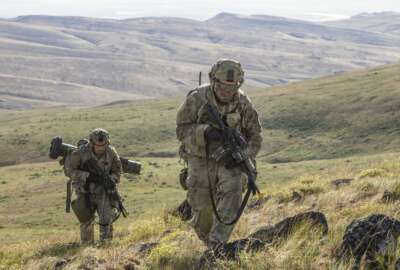The Army is delaying the massive overhaul of its enterprise IT personnel system by nearly a year to undergo additional testing.
The Integrated Personnel Pay System — Army (IPPS-A) was supposed to roll out to active duty and reserve forces in December; however, it will now be pushed back to September 2022.
“We must make sure that IPPS-A is a thoroughly tested and high-quality product when delivered to soldiers, HR professionals and leaders,” said Lt. Gen. Gary Brito, deputy chief of staff for the Army G-1. “We are fully committed to delivering IPPS-A across all three components, meeting the needs of our soldiers and the Army of the future with a 21st century talent management system.”
The delayed segment of IPPS-A is the third release of the system. The Army National Guard benefited from release 2 in March 2020, when the standard installation and division personnel functionality was blended into the system. The first release was more of a groundbreaking for the system.
The latest iteration was supposed to give essential personnel service and talent management abilities to all three components.
There is still more work to do after release 3 as well. Release 4 will give all components pay services through IPPS-A, and after that the Army will weave in smaller updates. Those steps are on a timeline for full deployment by 2025, however, it is unclear at this point how the timeline for will be impacted by the delay.
“Over the past year, IPPS-A release 3 underwent an extensive across-the-board testing process designed to identify issues and ensure proper fielding with minimal disruption to soldiers,” said Col. Rebecca Eggers, IPPS-A functional management division chief. “The system completed two of three government tests, but is not ready to enter the final test phase. The stress tests revealed some interface and data-integration challenges, and we determined additional time will be needed to correct data-transfer issues and resolve software defects. The testing phase is working as designed by identifying issues that need to be addressed before going forward. IPPS-A is a giant leap forward and we are going to get it right.”
Now, the final test phase for release 3 — a limited user test — will be moved from September 2021 to June 2022.
“Each test phase has specific entrance and exit criteria, adding increased complexity with more data transfers from outdated legacy systems and the incorporation of real-world users to assess readiness to go live,” according to an Army release sent out Thursday.
IPPS-A has had some cost growth and time slippage in the past. Original estimates on the program had the Army hitting the payroll phase by 2016, according to 2012 Congressional hearing. That is now slated for the mid-2020s.
The Army awarded a five-year, $159 million contract to CACI in 2015 to develop the program. It won a second two-year, $112.5 million contract modification in 2019 for continued support work on IPPS-A.
Adding in other contracts related to development, support and equipment for the program, the Army has already spent about $900 million on building IPPS-A, and another $200 million on testing, support and implementation. It has another $77 million budgeted for development in 2022 and $16 million for training.
IPPS-A is touted by the Army as a way of bettering the personnel system for 21st century use by casting off old IT systems, centralizing data and giving soldiers a marketplace to showcase their talents for jobs that are not in the usual application files.
The Army said IPPS-A will transform “industrial age, paper-based systems” into a modern IT system. The services says the system will reduce problems with payroll and personnel glitches. Soldiers will also have mobile access to the system and will have near-real-time ability to check their files.
“With this new system we are going to have a much more robust way of identifying when commanders are choosing people who look a certain way or are from a certain unit,” Maj. Gen. J.P. McGee said when he was director of the talent management task force in 2019 as the talent marketplace was gaining traction. “We are going to be able to see whether Army commanders are meeting guidelines and following the letter of the law. That’s going to be an interesting discussion as we start seeing the choices that are made by commanders. At the core of what we have done is decentralize to trust brigade level commanders to exercise this responsibility effectively, and if they don’t, they’ll be notified and held accountable. That will be a very uncomfortable conversation.”
Copyright
© 2024 Federal News Network. All rights reserved. This website is not intended for users located within the European Economic Area.
